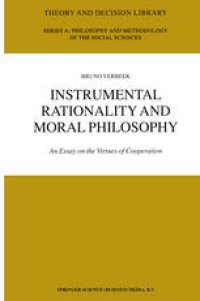
Ebook: Instrumental Rationality and Moral Philosophy: An Essay on the Virtues of Cooperation
Author: Bruno Verbeek (auth.)
- Tags: Philosophy, Ethics, Ontology, Economic Theory, Operation Research/Decision Theory
- Series: Theory and Decision Library 33
- Year: 2002
- Publisher: Springer Netherlands
- Edition: 1
- Language: English
- pdf
Many academic authors incur debts in the production of their work, many of which are intellectual. I am no exception. One of my intellectual debts is to three remarkable books, which formed the starting point for my thinking about norms. The first of these books is well known among philosophers: David Lewis' Convention. In vintage Lewisian prose, the book gives a lucid and convincing conventionalist analysis of semantic norms. The second 1985 dissertation Wederkerige book is Govert den Hartogh's Verwachtingen (Mutual Expectations). Partly because it was written in Dutch - my native tongue -partly because of the occasionally impenetrable style, it never got the attention it deserves. In that book, Den Hartogh extends Lewis' analysis of semantic norms to moral norms. Den Hartogh introduced the notion of cooperative virtues that is the focus of much of this book. The third book is a book on economics, largely ignored by economists, which only lately has started to receive some recognition among philosophers: Robert Sugden's The Economics of Rights, Co operation and Welfare. Sugden's book explains the emergence and stability of norms in terms of social evolution. Though all three books develop a of norms, their arguments and constructions are conventionalist account very different. Lewis and Den Hartogh take the picture of rational man deliberating about his course of action very serious; Sugden rejects this picture as unrealistic and unnecessary.
This book deals with a fundamental problem in political and moral philosophy: why should an otherwise rational agent comply with norms? The book is unique in that it deals with this question against the background of previously unconnected work in areas as diverse as evolutionary game theory, moral philosophy, action theory, formal decision theory, and social psychology. The author argues that standard rational choice analyses fail to explain several crucial features of norm-guided behavior. A complete analysis of the reasons rational agents have for compliance with norms has to include an account of specific virtues, such as trust and fairness. In order to accommodate these virtues in the theory of rational choice, Verbeek argues that we need to give up the inherently forward-looking character of instrumentally rational deliberation.
Audience: This book will be of interest to students, philosophers, and economists, as well as other social theorists interested in norms.
This book deals with a fundamental problem in political and moral philosophy: why should an otherwise rational agent comply with norms? The book is unique in that it deals with this question against the background of previously unconnected work in areas as diverse as evolutionary game theory, moral philosophy, action theory, formal decision theory, and social psychology. The author argues that standard rational choice analyses fail to explain several crucial features of norm-guided behavior. A complete analysis of the reasons rational agents have for compliance with norms has to include an account of specific virtues, such as trust and fairness. In order to accommodate these virtues in the theory of rational choice, Verbeek argues that we need to give up the inherently forward-looking character of instrumentally rational deliberation.
Audience: This book will be of interest to students, philosophers, and economists, as well as other social theorists interested in norms.
Content:
Front Matter....Pages i-xii
Introduction....Pages 1-7
Conventionalism and Moral Motives....Pages 9-83
Motives for Unconditional Cooperation....Pages 85-123
Motives for Conditional Cooperation: Reciprocity, Trust and Fairness....Pages 125-158
Virtuous Motives: Restraint and Spontaneity....Pages 159-176
Evolution of the Cooperative Virtues: An Indirect Justification....Pages 177-215
The Rationality of Plans: Requirements of Dynamic Choice....Pages 217-247
The Rationality of Strategic Intentions: A Justification of the Cooperative Virtues....Pages 249-271
Back Matter....Pages 273-288
This book deals with a fundamental problem in political and moral philosophy: why should an otherwise rational agent comply with norms? The book is unique in that it deals with this question against the background of previously unconnected work in areas as diverse as evolutionary game theory, moral philosophy, action theory, formal decision theory, and social psychology. The author argues that standard rational choice analyses fail to explain several crucial features of norm-guided behavior. A complete analysis of the reasons rational agents have for compliance with norms has to include an account of specific virtues, such as trust and fairness. In order to accommodate these virtues in the theory of rational choice, Verbeek argues that we need to give up the inherently forward-looking character of instrumentally rational deliberation.
Audience: This book will be of interest to students, philosophers, and economists, as well as other social theorists interested in norms.
Content:
Front Matter....Pages i-xii
Introduction....Pages 1-7
Conventionalism and Moral Motives....Pages 9-83
Motives for Unconditional Cooperation....Pages 85-123
Motives for Conditional Cooperation: Reciprocity, Trust and Fairness....Pages 125-158
Virtuous Motives: Restraint and Spontaneity....Pages 159-176
Evolution of the Cooperative Virtues: An Indirect Justification....Pages 177-215
The Rationality of Plans: Requirements of Dynamic Choice....Pages 217-247
The Rationality of Strategic Intentions: A Justification of the Cooperative Virtues....Pages 249-271
Back Matter....Pages 273-288
....